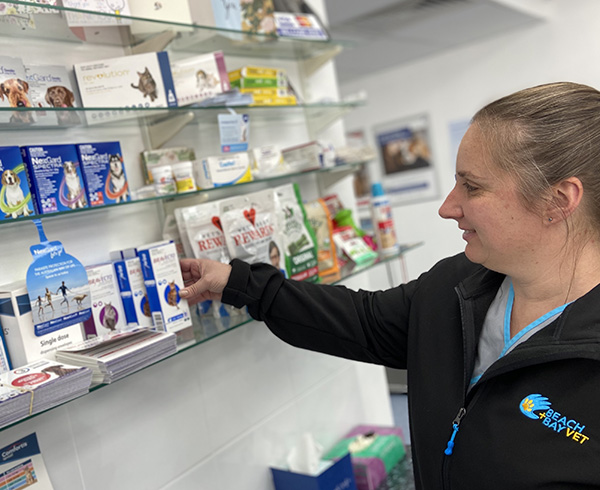Parasite Prevention
at Beach + Bay Vet
Parasite Prevention
We strongly advise that all dogs and cats on the Central Coast are regularly given effective products to prevent:
- Paralysis ticks
- Fleas
- Gastrointestinal worms, including roundworm, hookworm, whipworm and tapeworm
- Heartworm* (*optional for cats due to their naturally-lower risk).

Paralysis ticks
Paralysis ticks are common on the Central Coast, and can be active all year round. One of these ticks attaching to your pet can lead to progressive signs of paralysis, such as:
- weakness, starting with the back legs and leading to inability to stand
- increasing breathing difficulties
- retching and vomiting
- change in bark or miaow
Tick paralysis can kill your pet. Treatment for severe paralysis can cost thousands of dollars for ventilation (artificial breathing for your pet) at a specialist hospital. Even milder cases of tick paralysis can require expensive tick antiserum medication, hospitalisation and oxygen supplementation. It is safest, kindest and cheapest to prevent ticks attaching to your pet in the first place!
Remember, no product is guaranteed 100% protective, but many veterinary products are >98% effective if used correctly according to the instructions, and in most pets they are generally safe and well-tolerated.
If you think your pet may have a tick, please call our team to book an emergency consultation – rapid assessment and treatment will improve your pet’s chance of a rapid recovery.
Fleas
Fleas are very common in dogs and cats. They can hatch all year round in the warmth your home, and once they start to breed in your house, they can be difficult to get rid of.
Signs of fleas present on your pet can include:
- increased scratching or fur-nibbling around their body and head
- excessive grooming in cats, sometimes causing patchy fur
- itchy red skin bumps, particularly just above the tail, or around the head and neck in cats
- development of raw, scabby skin areas from your pet scratching and damaging their skin
- black specks of “flea dirt” (flea poo) in your pet’s coat, or even live fleas (less commonly seen in cats unless infestation is severe)
- in puppies and kittens, or animals with severe long-term infestation, signs of anaemia due to blood loss can develop (weakness, pale gums, weight loss)
Some animals are allergic to the flea bites, and will show severe raw skin lesions over larger areas of their body. This is called Flea Allergy Dermatitis.
We would advise applying effective flea prevention to your dog or cat throughout the year to prevent issues. If you do see fleas on your pet, phone our friendly team to ask for advice on how to treat the issue. If your pet has raw or red skin areas, it’s generally best to book a consultation for veterinary treatment.
Heartworm
Heartworm is a parasite transmitted into your pet’s bloodstream by heartworm-carrying mosquito bites. The microscopic larvae develop and grow large enough to lodge in the animal’s heart and lung blood vessels and obstruct blood flow. Heartworm can make your pet seriously ill with fatigue, a persistent cough and weight loss. Affected animals can go on to develop fatal heart failure.
Heartworm can be treated if caught early, but treatment itself can be risky, and permanent damage to the heart and lungs may have occurred. Prevention is always best!
Dogs are the natural host for heartworm, so are very susceptible to it. We strongly recommend all dogs are protected all year round from heartworm.
Cats are not a natural host for heartworm, so it is less common for worms to successfully develop in cats to the point where they can cause issues. However, heartworm disease in cats does rarely occur, so you may wish to use a heartworm prevention product in your pet if they go outdoors.
If you realise your pet has been unprotected against heartworm, please book a consultation with one of our lovely vets. We can perform a simple blood test to check if your animal has been exposed, and recommend ongoing treatment/prevention.
Gastrointestinal worms
The most common internal worms in dogs and cats are roundworm, hookworm, whipworm and tapeworm. If your dog or cat has worms, you may see signs such as:
- diarrhoea, sometimes with blood or worms visible
- vomiting, sometimes containing worms
- weight loss or poor condition
- general lethargy
- increased “bottom scooting” on the floor
Puppies and kittens are more likely to become severely affected, and can become very weak and unwell due to blood loss and loss of nutrients.
Some roundworms, hookworms and tapeworms can also be transmissible to people from affected animals. These worms can cause serious health issues in people. Therefore, as well as regular parasite control in your pet, we always recommend effective hand washing after handling your pet, especially before eating or preparing food!
We recommend using an effective all-wormer in puppies and kittens every 2 weeks until they are 12 weeks old, then monthly until 6 months old, and then every 3 months in adult dogs.
If you think your dog or cat may have worms, but they are still quite well, please phone us for advice. We may advise you bring in a fresh poo sample from your pet for worm testing, or else just recommend an effective worming product. If your pet is unwell, please book your pet in for a consultation.
What parasite control routine should I use for my dog?
We find the following products effective and generally safe for parasite prevention in dogs
- Bravecto for dogs: a 3-monthly chew/6-monthly spot-on for tick, flea and mites prevention
- Nexgard for dogs: monthly chews for tick, flea and mites prevention
- Nexgard Spectra: a monthly chew for tick, flea, heartworm and partial gastrointestinal worming prevention (excludes tapeworm)
- Proheart SR-12: an annual injection for heartworm prevention
- Popantel All-wormer: a gastrointestinal all-wormer given every 2-4 weeks for puppies and every 3 months for adult dogs
- Milbemax: a monthly tablet for heartworm and gastrointestinal worm prevention
- Popantel Tapewormer: a tapewormer tablet used every 4 weeks for puppies or dogs working with livestock, and every 3 months for regular adult dog/cats
Therefore, for thorough parasite control in your dog, you could consider combinations of products such as:
- Option 1: Bravecto every 3 or 6 months + Proheart SR-12 yearly + Cazitel every 3 months
- Option 2: Nexgard Spectra monthly + Popantel tapewormer every 1-3 months
What parasite control routine should I use for my cat?
- Bravecto Plus for cats: a 3-monthly spot-on for tick and flea prevention
- Milbemax: a worming tablet given every 4 weeks for kittens, or every 3-6 months for an adult cat.
- Popantel Tapewormer: a tapeworming tablet given every 4 weeks for kittens, or every 3 months for an adult cat
Therefore, for thorough parasite control in your cat, you could consider combinations of products such as:
- Bravecto Plus for cats + Popantel (Tapewormer) worming tablet
Which product you choose depends on the frequency at which you wish to apply products, the level of protection your pet requires for their lifestyle and age, and sometimes, the flavour of chew your pet prefers! Please phone Beach and Bay Vet to ask for advice if you are unsure.
Does my guinea pig or rabbit need parasite prevention?
Rabbits and guinea pigs on the Central Coast tend not to require regular parasite prevention in the same way as dogs and cats. However, these pets can commonly suffer from skin mites (seen as increased itchiness, sometimes with dry skin flakes and wounds secondary to scratching). If you suspect mites in your pet, please book a consultation with one of our vets for diagnosis and discussion of safe treatment options.
Contact Us Today!
OPENING HOURS
8:30am – 6pm Monday-Friday
8:30am – 1pm Saturday
MAKE A BOOKING
CALL US
SEND US A MESSAGE

Beach and Bay Vet is an inclusive and welcoming space for everyone.
We acknowledge the traditional owners of the land on which we live and pay our respects to elders past and present.
We welcome pets from Empire Bay and the surrounding area, including Bensville, Blackwall, Booker Bay, Ettalong, Killcare, Killcare Heights, Point Clare, Umina, and Woy Woy.
